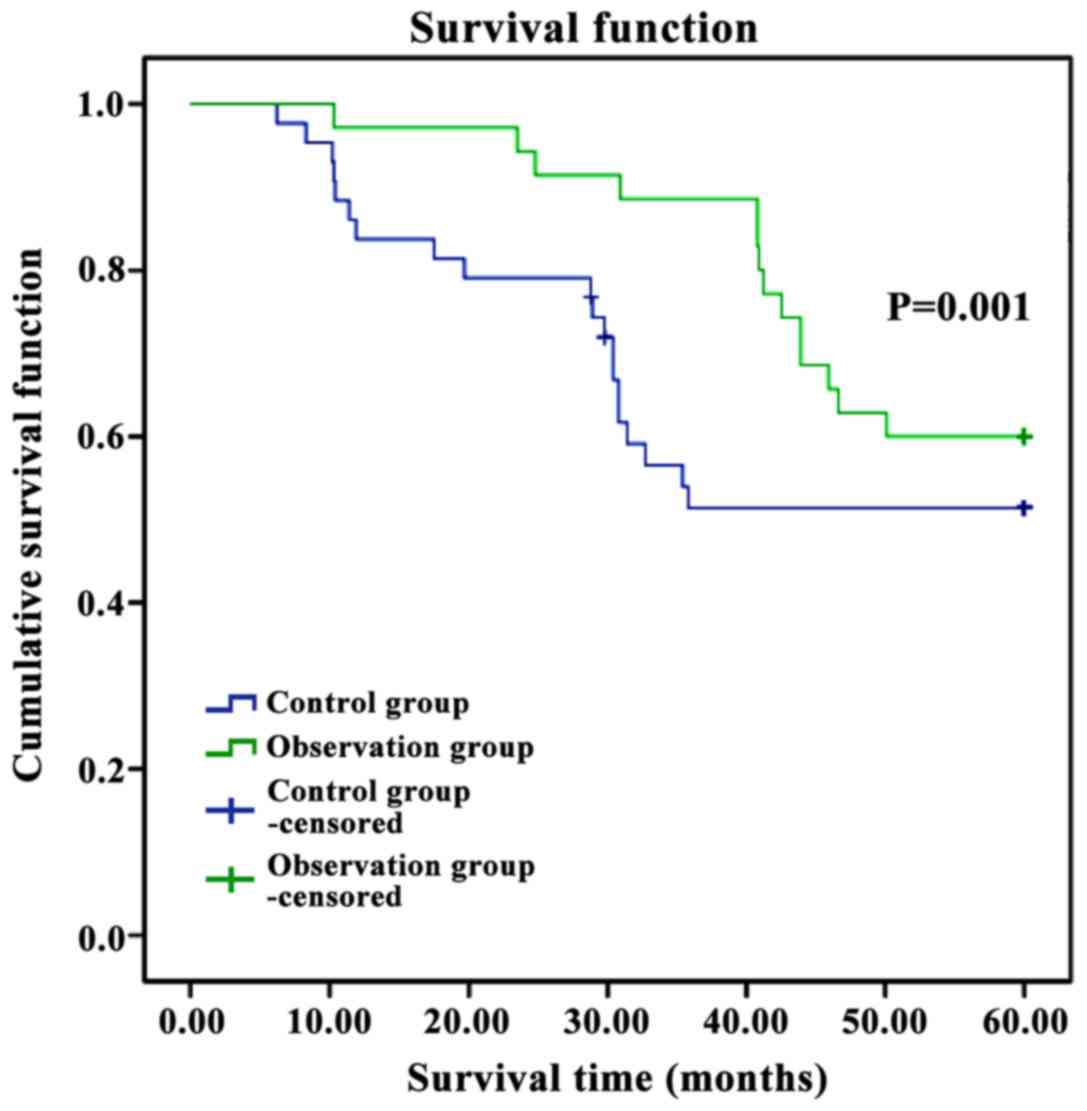|
1
|
Travis WD, Travis LB and Devesa SS: Lung
cancer. Cancer. 75:191–202. 1995. View Article : Google Scholar : PubMed/NCBI
|
|
2
|
Del Vescovo V and Denti MA: microRNA and
lung cancer. Adv Exp Med Biol. 889:153–177. 2015. View Article : Google Scholar : PubMed/NCBI
|
|
3
|
Howlader N, Noone AM, Krapcho M, Miller D,
Bishop K, Kosary CL, Yu M, Ruhl J, Tatalovich Z, Mariotto A, et al:
SEER Cancer Statistics Review, 1975–2014National Cancer Institute;
Bethesda, Md: http://seer.cancer.gov/csr/1975_2014based on
November 2016 SEER data submission posted to the SEER web site.
April. 2017
|
|
4
|
Puri V, Patel A, Majumder K, Bell JM,
Crabtree TD, Krupnick AS, Kreisel D, Broderick SR, Patterson GA and
Meyers BF: Intraoperative conversion from video-assisted
thoracoscopic surgery lobectomy to open thoracotomy: A study of
causes and implications. J Thorac Cardiovasc Surg. 149:55–61. 2015.
View Article : Google Scholar : PubMed/NCBI
|
|
5
|
Yu PS, Capili F and Ng CS: Single port
VATS: Recent developments in Asia. J Thorac Dis. 8:302–307.
2016.
|
|
6
|
Klapper J and D'Amico TA: VATS versus open
surgery for lung cancer resection: Moving toward a minimally
invasive approach. J Natl Compr Canc Netw. 13:162–164. 2015.
View Article : Google Scholar : PubMed/NCBI
|
|
7
|
Cooper WA: Preface-molecular genetics of
lung cancer. Transl Lung Cancer Res. 4:1092015.PubMed/NCBI
|
|
8
|
Mohamed SAA, Mousa EM, Hamed AM, Amin SE
and Abdel Aziz NMA: Utility of multidetector row computed
tomography and virtual bronchoscopy in evaluation of hemoptysis due
to lung cancer. Egypt J Chest Dis Tuberc. 65:279–287. 2016.
View Article : Google Scholar
|
|
9
|
Lin L, Gu ZT, Chen WH and Cao KJ:
Increased expression of the long non-coding RNA ANRIL promotes lung
cancer cell metastasis and correlates with poor prognosis. Diagn
Pathol. 10:14–21. 2015. View Article : Google Scholar : PubMed/NCBI
|
|
10
|
Yu JB, Soulos PR, Cramer LD, Decker RH,
Kim AW and Gross CP: Comparative effectiveness of surgery and
radiosurgery for stage I non-small cell lung cancer. Cancer.
121:2341–2349. 2015. View Article : Google Scholar : PubMed/NCBI
|
|
11
|
Pan TW, Wu B, Xu ZF, Zhao XW and Zhong L:
Video-assisted thoracic surgery versus thoracotomy for
non-small-cell lung cancer. Asian Pac J Cancer Prev. 13:447–450.
2012. View Article : Google Scholar : PubMed/NCBI
|
|
12
|
Laursen LØ, Petersen RH, Hansen HJ, Jensen
TK, Ravn J and Kongea L: Video-assisted thoracoscopic surgery
lobectomy for lung cancer is associated with a lower 30-day
morbidity compared with lobectomy by thoracotomy. Eur J
Cardiothorac Surg. 49:870–875. 2016. View Article : Google Scholar : PubMed/NCBI
|
|
13
|
Liu C, Li Z, Bai C, Wang L, Shi X and Song
Y: Video-assisted thoracoscopic surgery and thoracotomy during
lobectomy for clinical stage I non-small-cell lung cancer have
equivalent oncological outcomes: A single-center experience of 212
consecutive resections. Oncol Lett. 9:1364–1372. 2015. View Article : Google Scholar : PubMed/NCBI
|
|
14
|
Gelalis ID, Arnaoutoglou CM, Politis AN,
Batzaleksis NA, Katonis PG and Xenakis TA: Bacterial wound
contamination during simple and complex spinal procedures. A
prospective clinical study. Spine J. 11:1042–1048. 2011. View Article : Google Scholar : PubMed/NCBI
|
|
15
|
Li SF, Hu YW, Zhao JY, Ma X, Wu SG, Lu JB,
Hu YR, Wang YC, Gao JJ, Sha YH, et al: Ox-LDL upregulates CRP
expression through the IGF2 pathway in THP-1 macrophages.
Inflammation. 38:576–583. 2015. View Article : Google Scholar : PubMed/NCBI
|
|
16
|
Waterland P, Ng J, Jones A, Broadley G,
Nicol D, Patel H and Pandey S: Using CRP to predict anastomotic
leakage after open and laparoscopic colorectal surgery: Is there a
difference? Int J Colorectal Dis. 31:861–868. 2016. View Article : Google Scholar : PubMed/NCBI
|
|
17
|
Hunter CA and Jones SA: IL-6 as a keystone
cytokine in health and disease. Nat Immunol. 16:448–457. 2015.
View Article : Google Scholar : PubMed/NCBI
|
|
18
|
Gomes M, Coelho A, Araújo A, Azevedo A,
Teixeira ALO, Catarino R and Medeiros R: IL-6 polymorphism in
non-small cell lung cancer: A prognostic value? Tumour Biol.
36:3679–3684. 2015. View Article : Google Scholar : PubMed/NCBI
|
|
19
|
Zhang YM, Mao YM and Sun YX: Genetic
polymorphisms of IL-6 and IL-10 genes correlate with lung cancer in
never-smoking Han population in China. Int J Clin Exp Med.
8:1051–1058. 2015.PubMed/NCBI
|
|
20
|
Goto T, Kadota Y, Mori T, Yamashita S,
Horio H, Nagayasu T and Iwasaki A: Video-assisted thoracic surgery
for pneumothorax: Republication of a systematic review and a
proposal by the guideline committee of the Japanese association for
chest surgery 2014. Gen Thorac Cardiovasc Surg. 63:8–13. 2015.
View Article : Google Scholar : PubMed/NCBI
|















